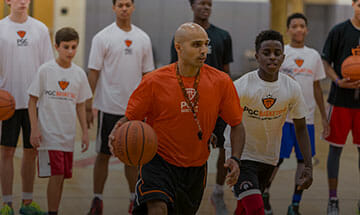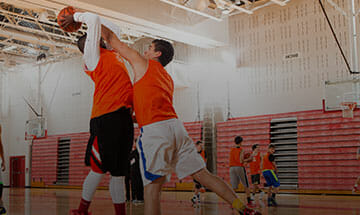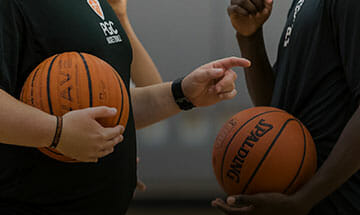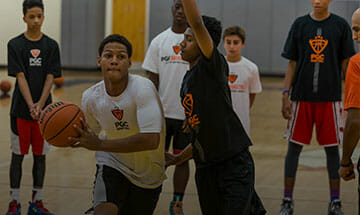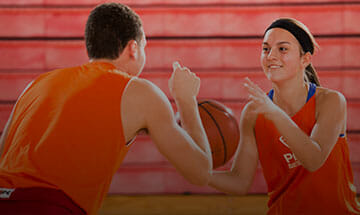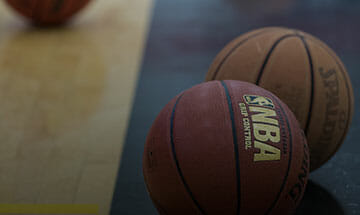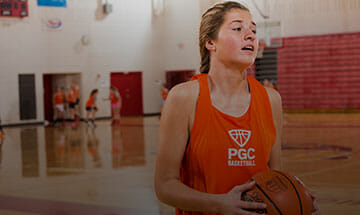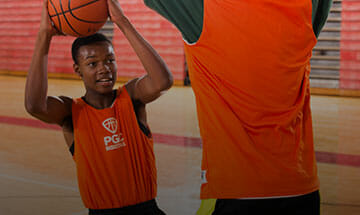The founder of PGC Basketball, Dick was a highly decorated high school and college player who was regarded as the prototypical “coach on the court.” He was named as the best high-school point guard in America by Parade Magazine and went on to earn Academic All-American and Atlantic Coast Conference (ACC) all-star honors at Duke. Later, he played and coached professionally in Europe and South America.
An English major and lover of literature, Dick authored five books during his lifetime—including STUFF! Good Players Should Know, praised as “the ultimate guide to playing the game the right way” by Larry Brown, the only coach ever to win both NCAA and NBA championships. Devenzio was considered by many to be a basketball genius, and Dick’s books continue to influence basketball lovers all over the world and have been translated into several foreign languages.
During college, Devenzio began running his own summer basketball camps, and he continued to offer sessions every summer until his sudden death in 2001 at just 52 years of age. The program he was most proud of, however, was the nationally acclaimed Point Guard Basketball College, the predecessor of PGC Basketball. Although Dick’s ingenuity, humor, and creativity are missed, his principles, ideas and teaching remain at the core of PGC's programs.
How to Get the Ball More on Offense
Basketball players shouldn’t be shy about asking for the ball. Read along to discover how to get the ball more often while working with your teammates not against.
Jumping is Not a Valuable Skill on Defense
Fleet means quick-moving, and here it is also a made-up word for “FLoored feEET.” Feet on the floor, on defense. Never leave your feet on defense, not even to block a pass, not even to block a shot. For every pass you block by jumping, two will get by you, and you will be slow getting to a good defensive help-position because you are not FLEET when you are in the air. You have to wait until you come down to move.
The Most Important Lesson on Leadership
A leader must always look for possibilities and opportunities and never give in to complaining or worrying about conditions or circumstances. Then always look for ways to turn things around, and never sink into self-pity or get discouraged.
Always Give 87% Effort
I used to run a basketball camp called the 87% Basketball Camp. Coaches would, on occasion, see a player wearing a T-shirt with that name and almost invariably their comment would be,
“Hey, what’s this 87 percent stuff? You gotta give 100 percent, Man.”
Often they took it a step further. “You gotta give 110 percent.”
Do you think 110 percent is enough? Some coaches demand 150 percent, others want 200 percent. I look for the athlete who gives an honest 87 percent, who knows it, and who is constantly trying to add 2 percent here and 2 percent there.
Are You Neglecting to Practice this Essential Basketball Skill?
If you aren’t trying to improve your communication skills and trying to have more of an impact on the atmosphere you are playing in, you are neglecting a big part of sport. Good, intelligent communication is important in just about everything, not just sports. This is a very broad and important subject about which many books have been written, but I am going to touch on just a few ideas for you to consider. The essential point to understand is that it is necessary to make a constant effort to improve your communication.
Do You Take Advantage of Dead Ball Time?
Mediocre players use this time to rest, to complain, to limp, to frown at referees, to look around at the crowd. The problem is that many talented players use the time when the clock is stopped for the same purposes. But there is an endless number of valuable things a good player can do while the clock is stopped if he is thinking and really trying to be as much of an asset to his team as he possibly can.
It’s My Fault
All sorts of things always go wrong. Big deal. We know that. That’s the given in the athletic algebra. The only unknown is you. It is apparently human nature to blame someone or something for failures and inadequacies. Typically, almost everyone blames the president or the governor or the mayor or the principal or the boss or the teacher…for whatever may have gone wrong. Athletes and fans, for the most part, do little to lift themselves beyond this phenomenon of “scapegoatism.” It’s always someone else’s fault, never yours.
Are You an Immature Athlete?
During practice, seek to be mature, not right. After practice you can work out the rights and wrongs, removed from the tension of competition and performance. What is the difference between a mature athlete and an immature athlete? The answer to this very important question every athlete ought to ask and think about daily is one hour.

